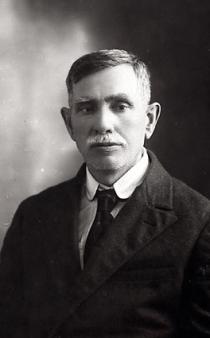The Landa family.
From left to right:
Rozaliya (Elena's mother), Sofia Landa- Kalikhman (Elena's maternal grandmother), Boris (Elena's maternal uncle), Yosef Landa (Elena's maternal grandfather), the older son Genrikh Landa.
My maternal grandpa's name was Josef Landa. He was a steward in some landowner's estate. He and my granny lived in a village in the territory of Bessarabia [a region, which occupies a part of Moldavia and the southern part of Odessa region] Now it is called Pridnestrovie.
Somewhere after 1905, after bourgeois-democratic revolution, peasants rebelled. They scorched the estate, but the landowner accused my grandpa of that. Grandpa couldn't stand all this disgrace and committed suicide. He left a widow with four children, who didn't have any speciality or skills at all.
All kids were very small. I suppose, the eldest son was 14 and my mum - 12. However surprising it was, all four children including my mum managed to obtain a higher education. In her old age granny lived at her eldest son Henrik's in Odessa.
Granny died in the 1960s, at a very old age. She was around 90 years old, but nobody knew her exact age as she kept it back. To what extent my grannies and grandpas were pious, what Jewish traditions they followed, I have no idea. Parents didn't tell me anything about that.
The eldest son, Henrik Landa, doctor of medical sciences, venerologist-dermatologist, lived in Odessa. His younger daughter died at the age of about twelve because of some disease. His son Garik during the war had graduated from the Military-Medical Academy in Samarkand City, then went to the front and perished. He was buried in the territory of Belorussia in a communal grave.
The youngest son Boris had graduated from a Pharmaceutical Institute, was a pharmacist and worked as a head pharmacist of a large pharmacy in Zhitomir. His daughter Nyura now lives in NewYork.
The youngest daughter Zinaida was a highly educated librarian and managed one of the largest libraries in Donetsk. Her daughter Ira has graduated here, in Leningrad, from the Financial-Economic Institute and at present lives in Israel.
At the war time all my aunts and uncles, who lived in Ukraine (particularly in Zhitomir, Odessa), were in Siberia (in Leninsk Kuznetsky) at evacuation and so they didn't suffer from the Holocaust.
My mum was born in 1905 in a village in Bessarabia. She had finished a secondary school (common, not Jewish one) with honours and entered the medical department of the Kiev State University.
As granny was left alone with four children, she was not able to help her daughter. Mum worked in a zemstvo [a local administration body in the 19th - beginning of the 20th centures], in what position - I don't know.
My maternal granny's name was Sofia Samuelovna Landa (nee: Kalihman). She was an uneducated woman, worked as a seamstress in her early years. Granny had two sisters: Ekaterina and Rebecca. Granny was almost twenty years older than her sisters.
Most likely, her father lacked money to pay for her education. When her sisters grew up a little he was rich enough to send the two of them to study. This is the reason why my granny, the only one of the three sisters, didn't get a higher education.
Unfortunately, I'm not aware of what Jewish traditions they followed and of things concerning their Jewish experiences. At the Soviet regime it wasn't customary to talk about such things, and I wasn't told a word about this. Ekaterina was born in 1892.
She had graduated from some institution of higher education [I don't know exactly, which one and when], became a lawyer, went to work to Leningrad. In Leningrad she was a member of the Leningrad Bar of Lawyers and dealt with criminal cases. She was single. She had a lot of gold things and money.
In November 1941, at the time of blockade, she was murdered by neighbours and they got hold of all her valuables. Rebecca was born in Odessa in 1893. She graduated from a medical institute, in youth worked in choleric barracks.
Then she became a specialist in virology and microbiology, and for many years was a senior scientist of the Institute of Vaccines and Serums in Moscow.
She invented a whole series of vaccines, that saved lives of a great number of people. Rebecca participated in creation of vaccines against spotted fever, typhoid; in the development of of gramizidine, by means of which they cure gas-gangrene.








